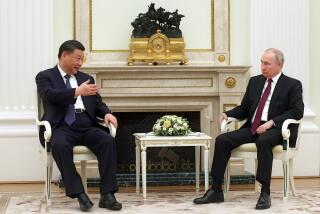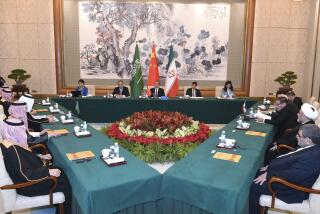Now That Soviets Have a Card, the China Game Is Over
- Share via
It is all but certain that Chinese Foreign Minister Qian Qichen’s visit to Moscow this week will be followed by a Sino-Soviet summit meeting and then by further rapid progress toward improvement of diplomatic, trade, cultural and other relations between the two giant neighbors. Ten years ago such developments would have alarmed American strategists, but not now. The calm American reaction to the prospects of Sino-Soviet reconciliation shows that the three-sided “card game” that has dominated Asian strategic politics for nearly two decades is over.
The origins of the card game lay in the Sino-Soviet border clashes of 1969. The Soviet threat forced China to give up its isolation from both superpowers. By inviting an American Ping-Pong team to visit in 1971, China used an opening to the United States to eventually gain strategic protection from the Soviet Union. In the late 1970s America played the China card, using the improved relations with China to bring pressure to bear on the Soviet Union. For a short time in 1982 China used the Soviet card, threatening to improve ties with the Soviet Union unless the United States agreed to reduce arms sales to Taiwan.
The Soviets were always the odd man out at the card table. As soon as Mao died, Leonid I. Brezhnev announced that Moscow would like to improve relations with Beijing. But the Chinese leaders symbolized their distrust of Moscow in the form of “three obstacles”: Before any substantial improvement in relations could take place, the Soviets must reduce military tensions on the Chinese border, withdraw from Afghanistan and persuade the Vietnamese to withdraw from Cambodia.
Rather suddenly in the last year or so, the three obstacles have all but disappeared. The Soviets removed an army division from Mongolia and took other steps to decrease border tensions. They announced their withdrawal from Afghanistan. Long skeptical about Vietnam’s expressed intention to withdraw from Cambodia, the Chinese now appear convinced by recent events in the region that the withdrawal is actually going to take place.
But the shrinking of the three obstacles alone would not have sufficed to melt China’s caution toward its northern neighbor. The Chinese have also taken note of the signing of the INF treaty, improved prospects for further new arms-control agreements of both strategic weapons (the START negotiations) and conventional weapons in Europe (mutual and balanced force reduction negotiations), the Soviets’ granting of more independence to their allies in Eastern Europe, and Soviet encouragement of North-South Korean dialogue. The Chinese have at last become convinced that the Soviet “new thinking” in foreign policy, stressing peace and development, is authentic.
The new Soviet foreign policy has been dictated by the urgent needs of domestic reform. Resources must be directed away from military expenditures for economic growth. From now on the Soviets will have to rely less on military threats and more on diplomacy to manage their relations in Asia. Mikhail S. Gorbachev, in a September speech on Asian policy in Krasnoyarsk, Siberia, said that he hoped a relaxed atmosphere in the Pacific region would make it possible to get foreign help, especially from Japan, in the development of Siberia. In the long run, when political conditions permit, we may even see South Korean and Taiwanese investment in that region.
While the new Soviet thinking has finally given Moscow a China card to play, at the same time it has deprived this card of its trump value in Soviet-American relations. Sino-Soviet rapprochement no longer threatens American interests--so long as it does not lead to a revival of the Moscow-Beijing military alliance, which is unimaginable. So long as it is limited to the establishment of normal political and economic relations, rapprochement will lead to a further reduction in regional tensions, to a further focus by countries in the region on economic growth instead of military confrontation, and to an improved security environment for the region, as well as the United States.
It is in this sense that the announcement of Qian’s trip to Moscow marked the end of the card game. It is not only that the China card has lost its value in Soviet hands. So long as military tensions in the region remain low, it will not be possible for any of the three powers to threaten the interests of a second power by improving relations with a third.
This is not to say that the new developments will not pose fresh challenges for American foreign policy. Precisely because the former military-based Soviet approach to Asia was such a failure, the Soviets were never able effectively to challenge American predominance in the region. The new, more sophisticated Soviet diplomacy will probably give the Soviets more influence in the region, increase pressure for American military withdrawal from South Korea and the Philippines, and strengthen the hand of those in New Zealand who oppose visits by American nuclear-armed warships. In the long run the new developments may hasten the withdrawal of American military power from both Northeast and Southeast Asia. The Asia that emerges may be more secure, but also less American-dominated.
More to Read
Sign up for Essential California
The most important California stories and recommendations in your inbox every morning.
You may occasionally receive promotional content from the Los Angeles Times.










